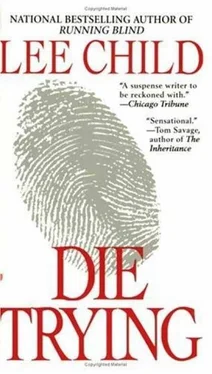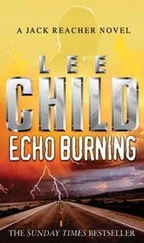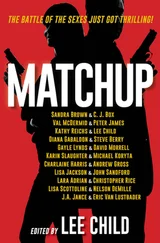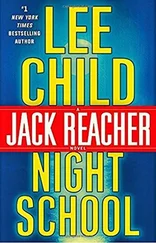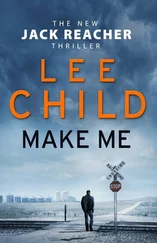Lee Child - Die Trying
Здесь есть возможность читать онлайн «Lee Child - Die Trying» весь текст электронной книги совершенно бесплатно (целиком полную версию без сокращений). В некоторых случаях можно слушать аудио, скачать через торрент в формате fb2 и присутствует краткое содержание. Жанр: Детектив, на английском языке. Описание произведения, (предисловие) а так же отзывы посетителей доступны на портале библиотеки ЛибКат.
- Название:Die Trying
- Автор:
- Жанр:
- Год:неизвестен
- ISBN:нет данных
- Рейтинг книги:5 / 5. Голосов: 1
-
Избранное:Добавить в избранное
- Отзывы:
-
Ваша оценка:
- 100
- 1
- 2
- 3
- 4
- 5
Die Trying: краткое содержание, описание и аннотация
Предлагаем к чтению аннотацию, описание, краткое содержание или предисловие (зависит от того, что написал сам автор книги «Die Trying»). Если вы не нашли необходимую информацию о книге — напишите в комментариях, мы постараемся отыскать её.
Lee Child was born in the industrial Midlands. He studied law, and worked for twenty years in commercial television. He lives in Cumbria with his wife and daughter. He is author of one previous thriller, Killing Floor.
Die Trying — читать онлайн бесплатно полную книгу (весь текст) целиком
Ниже представлен текст книги, разбитый по страницам. Система сохранения места последней прочитанной страницы, позволяет с удобством читать онлайн бесплатно книгу «Die Trying», без необходимости каждый раз заново искать на чём Вы остановились. Поставьте закладку, и сможете в любой момент перейти на страницу, на которой закончили чтение.
Интервал:
Закладка:
“Out,” he said. “We walk from here.”
McGrath shrugged and eased himself down into the circle of weapons. Borken stepped behind him and caught his arms. Cuffed his wrists together behind his back. Then he shoved him forward. Pointed beyond the ruined county office.
“Up there, dead man,” he said.
They left the jeep behind them next to the courthouse. The two guards formed up. McGrath stumbled across the street and up onto the lumpy knoll. He was pushed past the dead tree. He was pushed left until he found the path. He followed it around behind the old building. The rough ground bit up through the thin soles of his ruined city shoes. He might as well have been walking barefoot.
“Faster, asshole,” Borken grunted at him.
The guards were behind him, prodding him forward with the muzzles of their rifles. He picked up the pace and stumbled on through the woods. He felt the blood clotting on his lip and nose. After a mile, he came out into the clearing he recognized from the surveillance pictures. It looked bigger. From seven miles overhead, it had looked like a neat hole in the trees, with a tidy circle of buildings. From ground level, it looked as big as a stadium. Rough shale on the floor of the clearing, big wooden huts propped expertly on solid concrete piles.
“Wait here,” Borken said.
He walked away and the two guards took up station either side of McGrath as he gazed around. He saw the communications hut, with the phone wire and the whip antenna. He saw the other buildings. Smelled stale institutional food coming out of the largest. Saw the farthest hut, standing on its own. Must be their armory, he thought.
He glanced up and saw the vapor trails in the sky. The urgency of the situation was written up there, white on blue. The planes had abandoned their innocent east-west trawling. Their trails had tightened into continuous circles, one just inside the other. They were flying around and around, centered seven miles above his head. He stared up at them and mouthed: help! He wondered if their lenses were good enough to pick that out. Wondered if maybe Webster or Johnson or Garber or Johnson’s gofer could lip-read. His best guess was: yes, and no.
REACHER’S PROBLEM WAS a hell of an irony. For the first time in his life, he wished his opponents were better shots. He was concealed in the trees a hundred yards northwest of the courthouse. Looking down at six sentries. They were ranged in a loose arc, to the south and east beyond the big white building. Reacher’s rifle was trained on the nearest man. But he wasn’t shooting. Because if he did, the six men were going to shoot back. And they were going to miss.
Reacher was happy with an M-16 and a range of a hundred yards. He could pretty much absolutely guarantee to hit what he wanted with that weapon at that range. He would bet his life on it. Many times, he had. And normally, the worse shots his opponents were, the happier he’d be about it. But not in this situation.
He would be shooting from a northwest direction. His opponents would be shooting back from the southeast. They would hear his shots, maybe see some muzzle flash, they would take aim, and they would fire. And they would miss. They would shoot high and wide. The targets on the rifle range were mute evidence for that conclusion. There had been some competent shooting at three and four hundred yards. The damaged targets bore witness to that fact. But Reacher’s experience was that guys who could shoot just about competently at three or four hundred yards on a range would be useless in a firefight. Lying still on a mat and sighting in on a target in your own time was one thing. Shooting into a noisy confused hailstorm of bullets was a very different thing. A different thing entirely. The guy defending the missile trucks had proved that. His salvos had been all over the place. And that was the problem. Shooting back from the southeast, these guys’ stray rounds were going to be all over the place, too. Up and down, left and right. The down rounds and the left rounds were no problem. They were just going to damage the scrubby vegetation. But the up rounds and the right rounds were going to hit the courthouse.
The M-16 uses bullets designated M855. Common NATO rounds, 5.56 millimeters in caliber, just a fraction under a quarter-inch wide. Fairly heavy for their size, because they are a sandwich of lead and steel, inside a copper jacket. Designed for penetration. Those stray rounds which hit the courthouse were going to impact the siding at two thousand miles an hour. They were going to punch through the old wood like it wasn’t there at all. They were going to smash through the unstable dynamite like a train wreck. The energy of their impact was going to act like a better blasting cap than anything any mining company had ever possessed. That was what those bullets were designed to do. Some committee had asked for a bullet capable of shooting through the sides of ammunition trucks. And that’s what had been delivered.
So Reacher wasn’t shooting. Three sentries, he might have risked it. He figured he could get off three aimed shots in maybe three seconds. Too fast for any reaction. But six was too many. They were too spaced out. Too much physical movement was required between rounds. The later targets would have time to react. Not much time. Certainly not enough to be accurate. That was the problem.
Reversing the geometry would be no help, either. He could work himself right around to the south. It would take him maybe twenty minutes to skirt around in the trees and come back at them from the opposite direction. But then what? He would be looking at his targets, uphill. The courthouse would be right behind them. He could hit each of them in the head, no problem at all. But he couldn’t ask the bullets just to stop there in midair. He couldn’t prevent those high-energy copper-jackets bursting on out of the back of those skulls and heading on their uphill trajectories straight toward the courthouse’s second-story walls. He shook his head and lowered his rifle.
MCGRATH SAW BORKEN conferring with somebody on the edge of the clearing. It was the guy who had led the ambush squad. The guy who had taken his gun and his bullets and punched him in the face. The two of them were glancing at their watches and glancing up at the sky. They were nodding. Borken slapped the guy on the shoulder and turned away. Ducked into the trees and disappeared back toward the town. The ambush leader started in toward McGrath. He was smiling. He was unslinging his rifle.
“Showtime,” he called.
He stepped near and reversed the rifle in his hands as he did so. Smashed the butt into McGrath’s stomach. McGrath went down on the shale. One guard jammed the muzzle of his rifle into McGrath’s throat. The other jammed his into McGrath’s stomach, right where the blow had landed.
“Lie still, asshole,” the unit leader said. “I’ll be back in a minute.”
McGrath could not move his head because of the rifle in his throat, but he followed the guy with his eyes. He was going into the next-to-last hut in line. Not the armory, which stood on its own. Some kind of an equipment store. He came out with a mallet and ropes and four metal objects. Dull-green, Army issue. As he got nearer, McGrath recognized what they were. They were tent pegs. Maybe eighteen inches long, designed for some kind of big mess tent.
The guy dropped his load on the shale. The metal pegs clinked on the stones. The guy nodded to the soldier with the gun in McGrath’s belly, who straightened up and stepped away. The unit leader took his place. Used his own weapon to keep McGrath pinned down.
The soldier got busy. He seemed to know what he was supposed to do. He used the mallet to drive the first peg into the ground. The ground was stony and the guy had to work hard. He was swinging the mallet in a big arc and using a lot of force. He drove the peg down until it was two-thirds buried. Then he paced off maybe eight feet and started driving the second. McGrath followed him with his eyes. When the second peg was in, the guy paced another eight feet at a right angle and hammered the third peg in. The fourth peg completed an exact square, eight feet on a side. McGrath had a pretty good idea what that square was for.
Читать дальшеИнтервал:
Закладка:
Похожие книги на «Die Trying»
Представляем Вашему вниманию похожие книги на «Die Trying» списком для выбора. Мы отобрали схожую по названию и смыслу литературу в надежде предоставить читателям больше вариантов отыскать новые, интересные, ещё непрочитанные произведения.
Обсуждение, отзывы о книге «Die Trying» и просто собственные мнения читателей. Оставьте ваши комментарии, напишите, что Вы думаете о произведении, его смысле или главных героях. Укажите что конкретно понравилось, а что нет, и почему Вы так считаете.
